Most Black Americans identify as Christian, and many are highly religious by traditional measures of belief. For instance, belief in the divine is close to universal among Black Americans, the vast majority of whom say they believe in God or a higher power (97%). And most, when asked about the nature of the divinity they believe in, say it is “God as described in the Bible” (or, if they identify with a non-Christian religion, the holy scripture of that faith).
What do people envision when they think about God? Given that respondents may have had different things in mind, the survey also asked about several specific attributes people may associate with God. The findings show that majorities of Black Americans believe in a God with a presence in earthly affairs. Most Black adults – including many who are religiously unaffiliated – say they believe God has the power to determine what happens in the world and that God will judge people for their actions.
Black Americans are somewhat divided over whether belief in God is a prerequisite for morality. Just over half (54%) say believing in God is necessary for a person to be moral and to have good values, while a slightly lower share (44%) say it is not. And Black Protestants are more likely than Black Catholics to say belief in God is necessary for someone to be a good person.
Black women are more likely than men to say belief in God is required to be a moral person, to believe that God determines what happens in their lives, and to say religion is very important in their lives. And older Black adults are more likely than younger adults to hold these views.
Regardless of age or gender, most Black Americans who are affiliated with a religion see opposing racism and opposing sexism as essential to their religious identity, while far fewer say the same about attending religious services or opposing abortion.
This chapter also explores the views of Black Americans on other spiritual beliefs, including the power of prayer, evil spirits, reincarnation and praying to ancestors.
Most Black Americans say religion is very important to them
About six-in-ten Black adults (59%) say religion is very important in their lives. Another 21% say it is somewhat important, while smaller shares say it is not too (9%) or not at all (9%) important in their lives.
Among those who identify with a religion, Protestants (73%) are more likely than Catholics (49%) to say religion is very important to them. And eight-in-ten Protestants who attend religious services at least a few times a year say this, regardless of the racial composition of their congregation.
Far fewer religiously unaffiliated Black Americans – that is, those who identify as atheist, agnostic or “nothing in particular” – say religion is very important in their lives (18%), although nearly four-in-ten say religion is at least somewhat important to them.
Black women (64%) are more likely than Black men (51%) to say religion is very important in their lives, while older Black adults are more likely to say this than younger Black adults – both patterns that also are present in the U.S. public as a whole. And single-race Black Americans are more likely to feel religion is very important than are multiracial or Hispanic Black Americans.
Black adults with and without college degrees are about equally likely to say religion is very important to them.
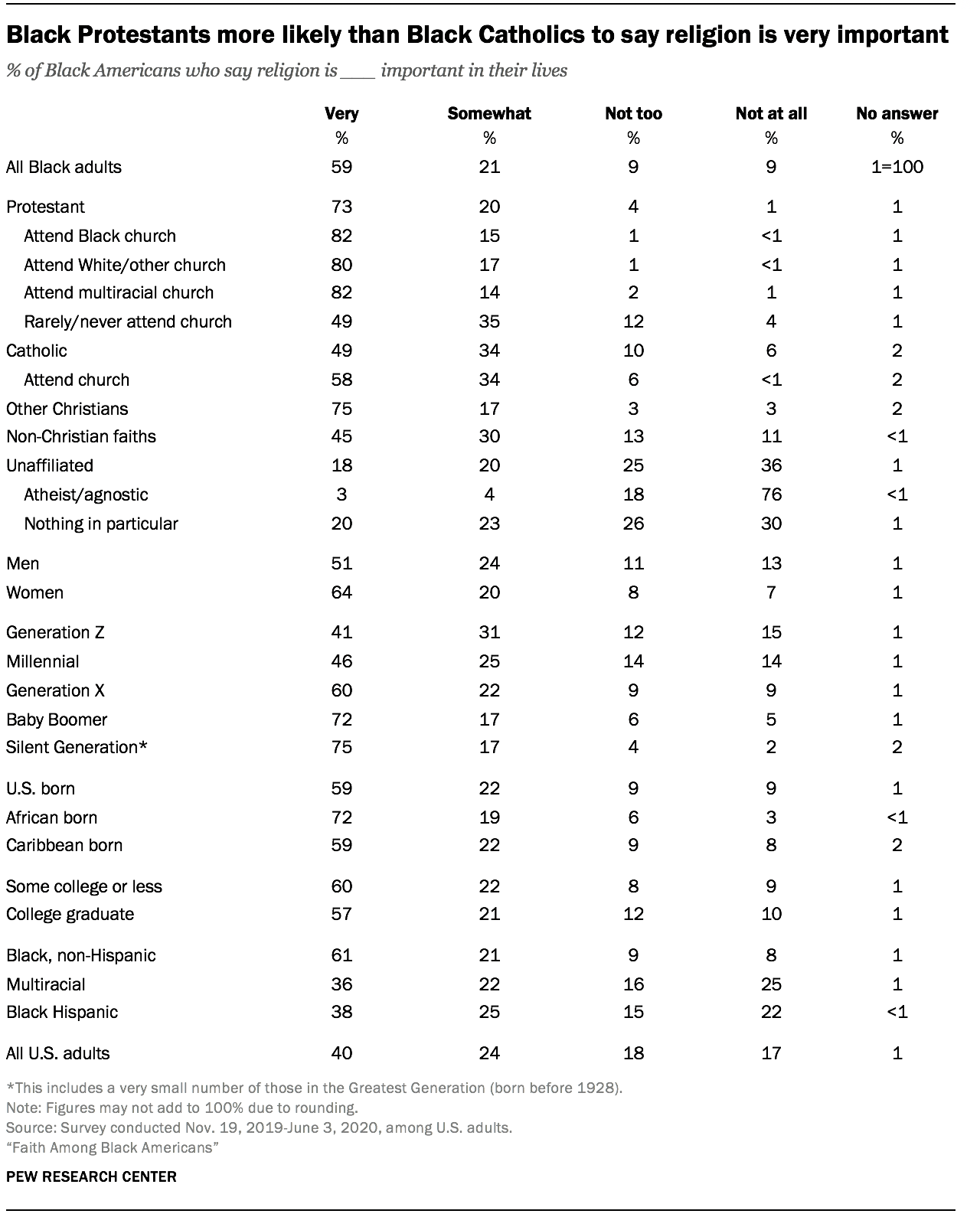
Black adults more likely than U.S. adults overall to believe in God of the Bible
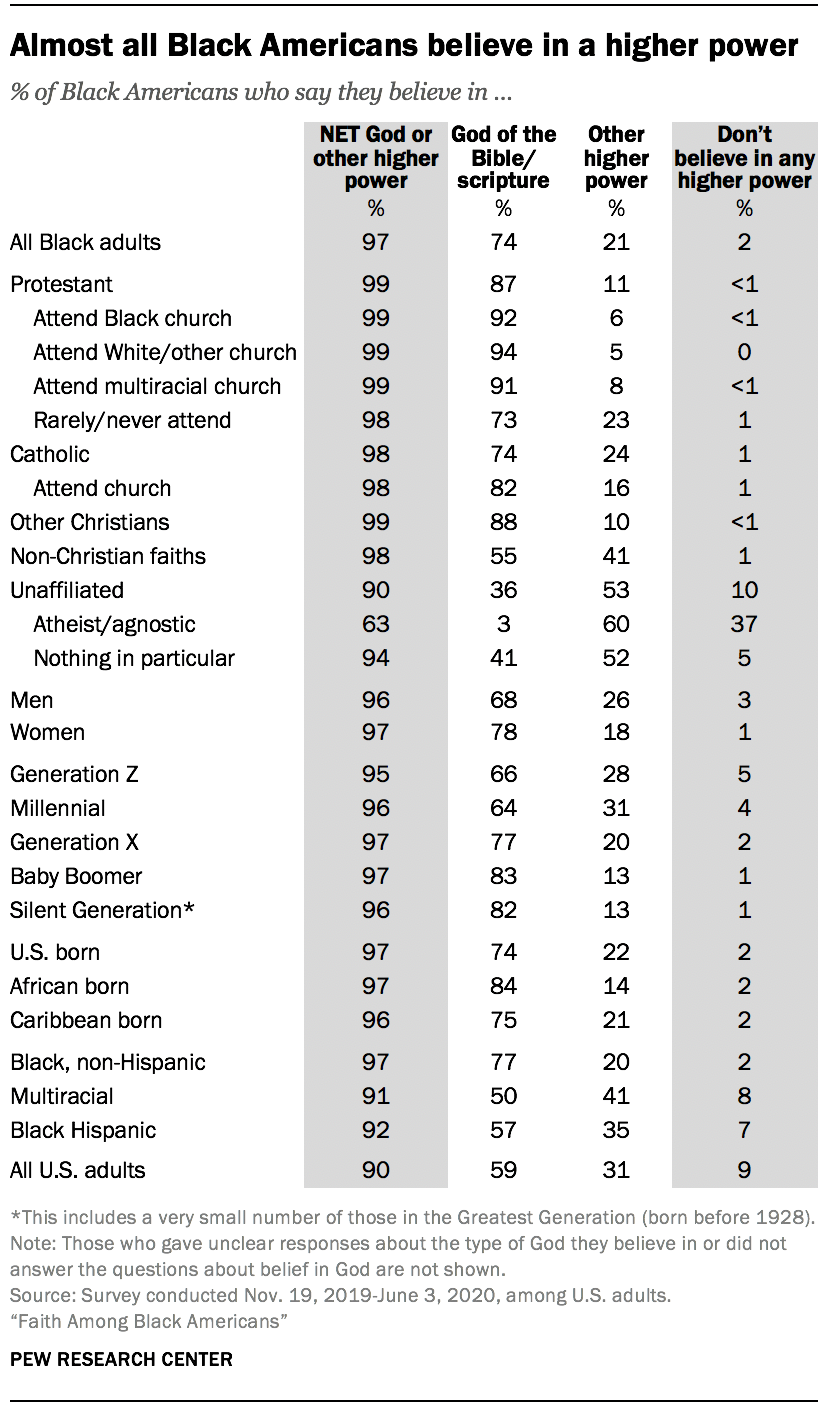 Almost all Black Americans (97%) say they believe in God or a higher power. When asked to specify further, three-quarters (74%) say they believe in God as described in their religion’s holy scripture (such as the Bible for Christians or the Quran for Muslims). An additional 21% say they do not believe in God as described in scripture, but that they do believe in some other kind of higher power or spiritual force. Only 2% report not believing in any kind of higher power at all.
Almost all Black Americans (97%) say they believe in God or a higher power. When asked to specify further, three-quarters (74%) say they believe in God as described in their religion’s holy scripture (such as the Bible for Christians or the Quran for Muslims). An additional 21% say they do not believe in God as described in scripture, but that they do believe in some other kind of higher power or spiritual force. Only 2% report not believing in any kind of higher power at all.
Among Christians, Black Protestants (87%) are more likely than Black Catholics (74%) to believe in the God of the Bible. Roughly nine-in-ten churchgoing Black Protestants believe this, regardless of the racial composition of their church.
While the vast majority (90%) of religiously unaffiliated Black Americans say they believe in God or a higher power, more of them say they believe in a spiritual power that is not the God of the Bible than say they believe in the God of the Bible (53% vs. 36%).
Black women are more likely than Black men (78% vs. 68%) to say they believe in the biblical God, and Black adults in the two youngest generations in the survey (Generation Z and Millennial) are less likely to say they believe in the God of Bible than those in older generations. But even among these younger adults, overwhelming majorities say they believe in some kind of higher power.
In addition, Black adults who identify racially as Black alone (77%) are more likely to believe in the God of the Bible (or some other holy scripture) than those who identify as Black and some other race (50%) or as Black and Hispanic (57%).
Most Black adults say the Bible is the word of God, but no consensus over whether it should be understood literally
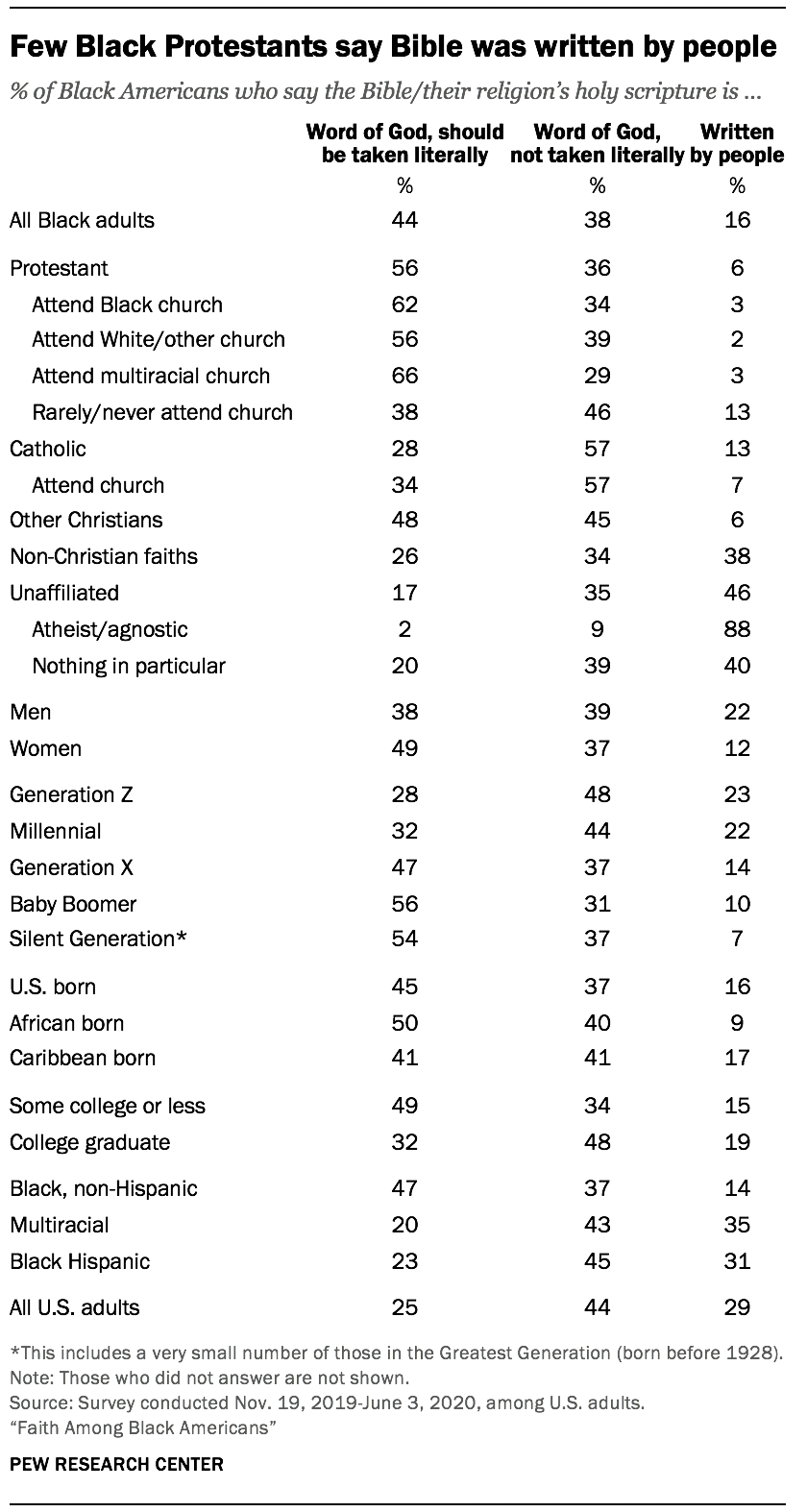 The majority of Black Americans believe their religion’s holy scripture (Christians were asked about the Bible and Muslims were asked about the Quran, for example) is the word of God.14 But there is no consensus on whether the text should be taken literally: Just over four-in-ten Black Americans (44%) say that the Bible or their religion’s holy scripture is the word of God and should be taken “literally, word for word,” and a somewhat smaller share (38%) say that while holy scripture is the word of God, “not everything in it should be taken literally, word for word.” And 16% of Black adults say that scripture was “written by people and is not the word of God.”
The majority of Black Americans believe their religion’s holy scripture (Christians were asked about the Bible and Muslims were asked about the Quran, for example) is the word of God.14 But there is no consensus on whether the text should be taken literally: Just over four-in-ten Black Americans (44%) say that the Bible or their religion’s holy scripture is the word of God and should be taken “literally, word for word,” and a somewhat smaller share (38%) say that while holy scripture is the word of God, “not everything in it should be taken literally, word for word.” And 16% of Black adults say that scripture was “written by people and is not the word of God.”
Among Black Christians, Catholics (28%) are less likely than Protestants (56%) to say they take the Bible literally, word for word. And among Black Catholics, 57% say the Bible is the word of God but that it should not be taken literally. Meanwhile, only about a quarter of Black adults who identify with non-Christian faiths (26%) say their respective holy scriptures should be taken literally.
Black college graduates are less likely than Black Americans who don’t have a college degree to say their religion’s sacred scripture should be taken literally (32% vs. 49%). And Black women and older Black adults are more likely to take this view than are Black men and younger Black Americans, respectively.
Compared with U.S. adults overall, Black Americans are more likely to say the Bible or their religion’s holy scripture is the word of God and should be taken literally, and they are less likely to say that scripture was written by people.
Widespread belief by Black adults in a God that engages with the world
When they think about God or some other higher power, clear majorities of Black Americans think of a powerful entity with a presence in earthly affairs. Most say they believe in a God who “has the power to direct or change everything that goes on in the world” (81%), who “will judge all people on what they have done” (74%), and who “directly determines what happens in your life” all (44%) or most (24%) of the time. Around half of Black Americans say that God or the higher power they believe in talks to them directly (48%).
Nine-in-ten churchgoing Black Protestants (regardless of the racial makeup of their churches) and a similar share of churchgoing Black Catholics believe that God can direct or change world events. Even most religiously unaffiliated Black Americans – including roughly two-thirds of those who describe their present religion as “nothing in particular” – believe in a God with this power.
There also is widespread agreement among Black Americans, across religious affiliations, that God or a higher power judges all people, though young adults are much less likely than older respondents to believe this. And while 57% of Black Protestants say they believe God talks to them directly, this is a minority view among Black Catholics and the religiously unaffiliated.
Black college graduates and those with less education are about equally likely to hold each of these four beliefs about God. African immigrants are more likely than U.S.-born Black adults to believe that God is guiding their life, judges all people and controls world events.
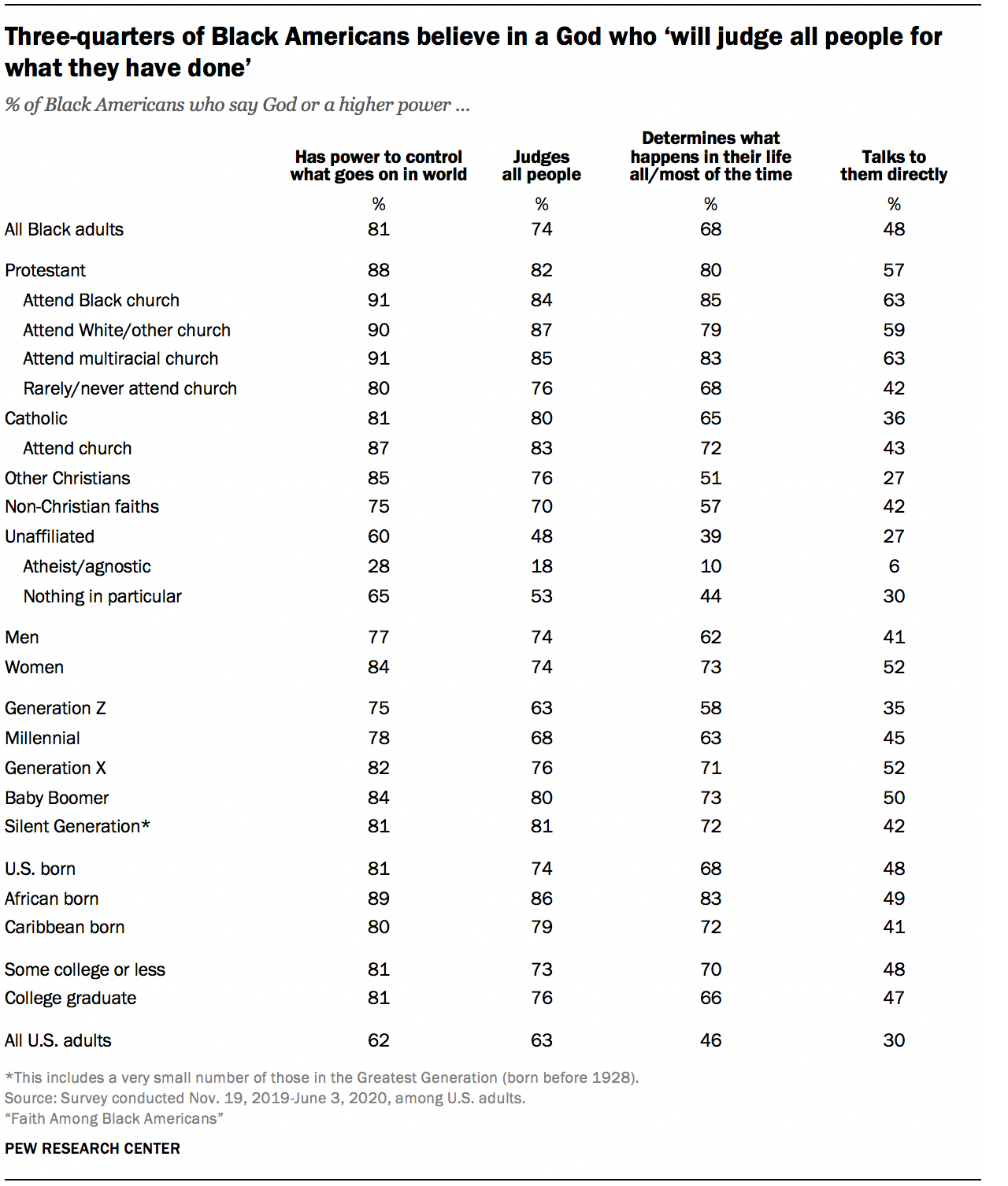
Just over half of Black Americans say belief in God is necessary for morality
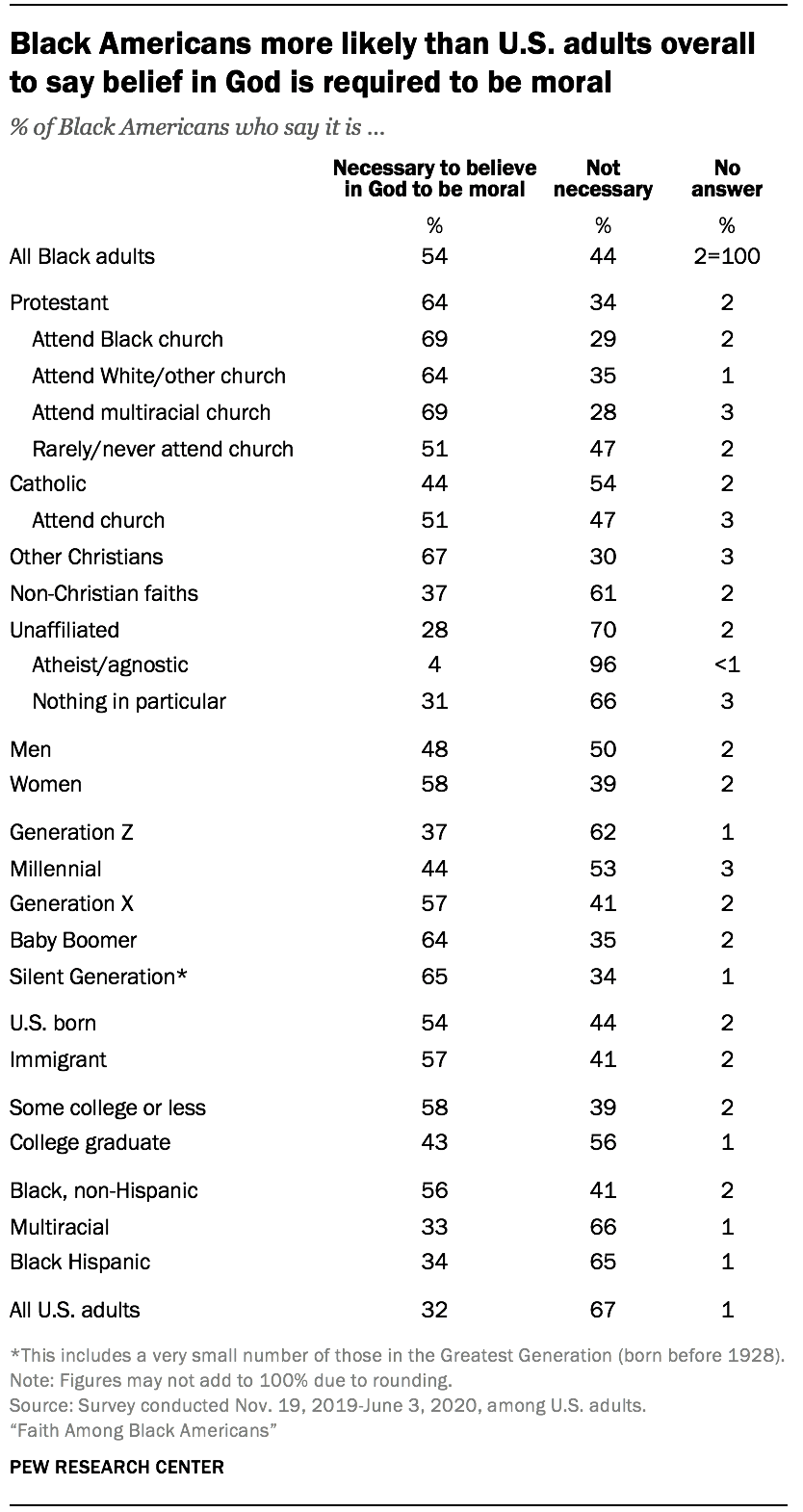 Among Black Americans, 54% say that belief in God is required in order for a person “to be moral and have good values.” Fewer (44%) say belief in God is not necessary to be moral and have good values.
Among Black Americans, 54% say that belief in God is required in order for a person “to be moral and have good values.” Fewer (44%) say belief in God is not necessary to be moral and have good values.
Across congregation types, Black Protestants who attend religious services at least a few times a year are more likely to say belief in God is necessary to be moral than to say it is not necessary. By comparison, Catholics who attend religious services are evenly divided on this question. Black Protestants who rarely or never attend religious services also are split.
For Black Americans who are unaffiliated with a religion or who identify with a non-Christian faith, the balance of opinion swings the other direction, with majorities in both groups saying it is not necessary to believe in God to be a moral person. And Black adults with a college degree are more likely than those with less education to take this position.
Large majorities of Black Americans believe in the power of prayer and evil spirits
The survey also asked about spiritual views, finding that majorities of Black Americans believe prayer can heal physical illness and injury (78%) and that evil spirits can cause problems in people’s lives (73%). Fewer believe in reincarnation (that people will be reborn again and again in this world, 39%) and that prayers to ancestors can protect them from bad things happening (33%).
Black Protestants are more likely than Black Catholics to believe prayer can heal and evil spirits can cause harm, while Catholics are more likely to believe in reincarnation and that prayers to ancestors can protect them. Among Black Protestants, those who go to Black churches or multiracial congregations are more likely than those who attend White or other churches to believe in reincarnation and that prayers to ancestors can protect them.
Religiously unaffiliated Black adults are less likely than those who identify with a religion to believe in the healing power of prayer and in the power of evil spirits, though around half or more of “nones” express these beliefs. And Black “nones” are more likely than Black Protestants to believe in reincarnation, and slightly more likely to believe that prayers to ancestors can protect them.
While Black Americans in the two youngest generations (Millennial and Generation Z) are generally less likely than those in older generations (Baby Boomer and older) to express many of the religious beliefs asked about in this survey, they are more likely than older adults to believe in reincarnation and that prayers to ancestors can protect them. And while offering prayers to ancestors is often viewed as a traditional African religious practice, African immigrants are no more likely than U.S.-born Black Americans to believe it can protect them from bad things happening (33% each).15
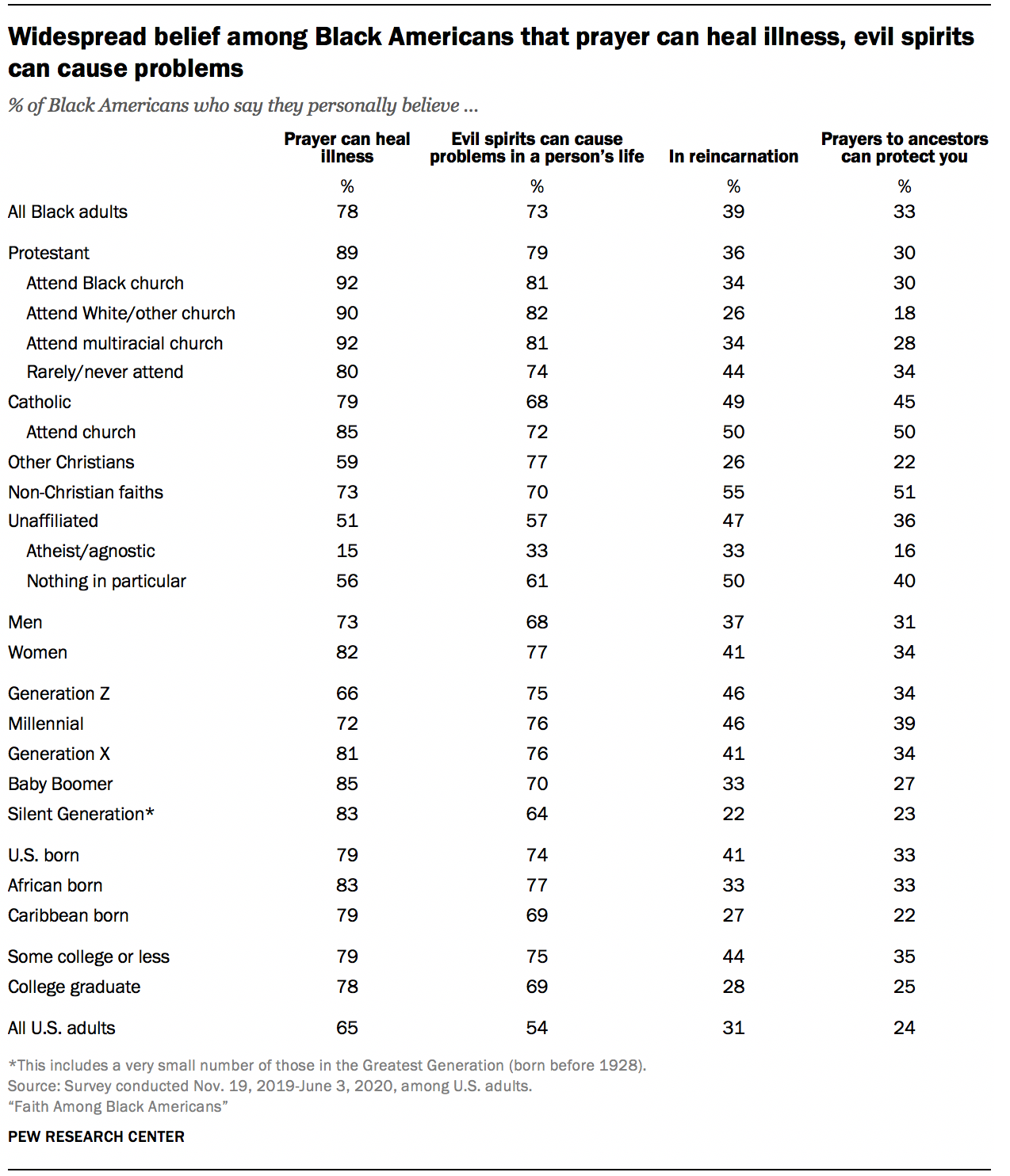
Majorities of Black Protestants and Catholics say opposing racism and sexism are essential to their faith
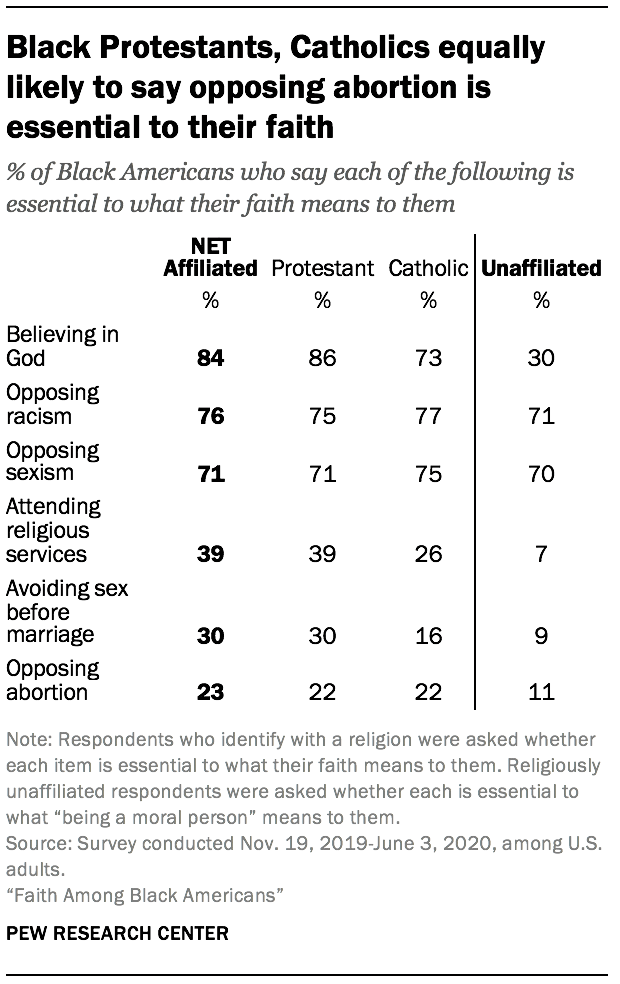 The survey also asked Black Americans who identify with a religion to evaluate six different beliefs and practices and to say whether each is an “essential” part of their religious identity, an “important, but not essential” part, or not an important part.
The survey also asked Black Americans who identify with a religion to evaluate six different beliefs and practices and to say whether each is an “essential” part of their religious identity, an “important, but not essential” part, or not an important part.
Black Americans who identify with a religion are most likely to say belief in God is essential to what their faith means to them (84%), while large majorities say the same about opposing racism (76%) and sexism (71%). Fewer say it is paramount to their faith to attend religious services (39%), avoid sex before marriage (30%) or oppose abortion (23%).
This pattern of responses holds across Black Protestant groups, regardless of the racial composition of their church or how often they attend. Black Catholics, on the other hand, are no more likely to say belief in God is essential to their faith (73%) than they are to say the same about opposing racism (77%) and sexism (75%).
Respondents who are religiously unaffiliated were asked a slightly different question – whether they connect these six beliefs and practices with “being a moral person.” Three-in-ten religiously unaffiliated Black Americans see belief in God as essential to what being a moral person means to them. And about one-in-ten say it’s essential to attend religious services (7%), avoid premarital sex (9%) and oppose abortion (11%) to be a moral person. Seven-in-ten, though, say they view both opposing racism and sexism as moral imperatives, close to the shares of Protestants and Catholics who see these as essential to their faith.
Half of Black Americans say it’s a religious duty to convert nonbelievers
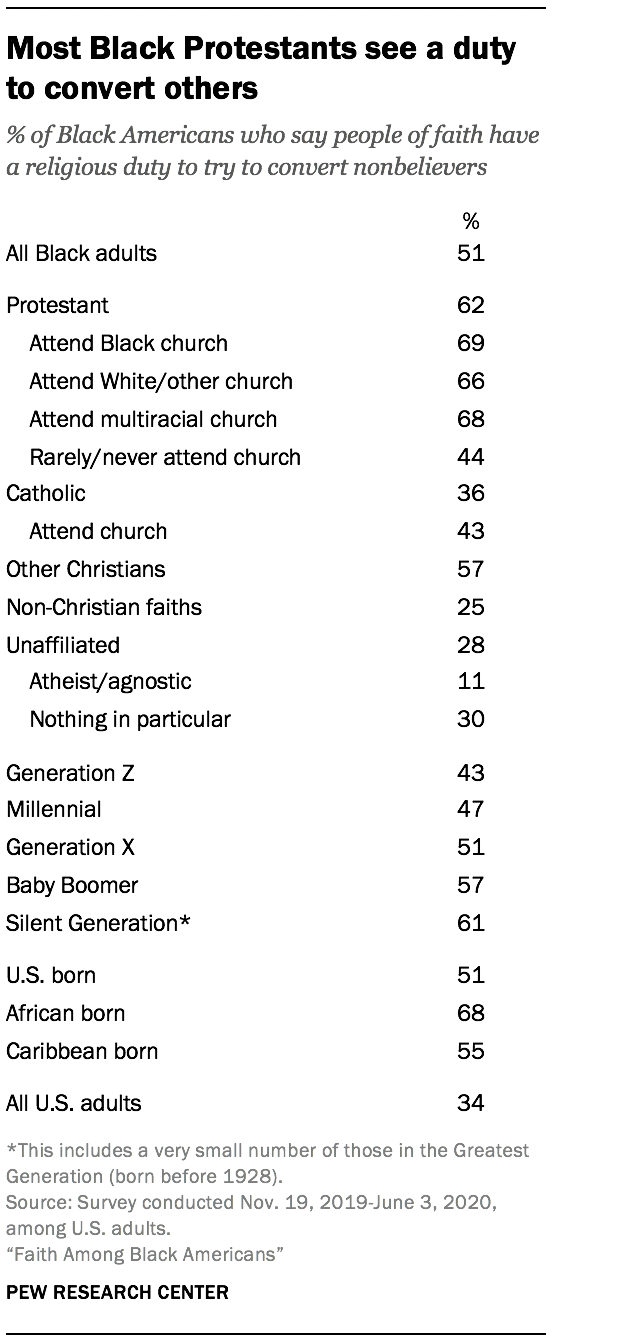 Black Americans are about evenly divided on whether people of faith have a duty to convert nonbelievers, with 51% saying that religious people have this duty and 46% saying they do not.
Black Americans are about evenly divided on whether people of faith have a duty to convert nonbelievers, with 51% saying that religious people have this duty and 46% saying they do not.
The view that religious people do have the duty to proselytize is more common among Protestants than among Catholics. About six-in-ten Protestants (including nearly seven-in-ten churchgoing Protestants) say that people of faith have a duty to convert nonbelievers. Among Catholics, only about a third (and 43% of churchgoing Catholics) say this.
Roughly half or fewer of Black Americans in younger generations (Generation Z, Millennials and Generation X) see a duty to convert nonbelievers, compared with about six-in-ten among Baby Boomers and older generations.
Among Black Americans who believe their religion’s holy scripture is the literal word of God, about three-quarters (73%) believe they have a duty to convert nonbelievers, compared with 42% of those who believe their religion’s holy scripture is the word of God but should not be taken literally and only 14% of those who believe holy scripture was written by people and is not the word of God.


